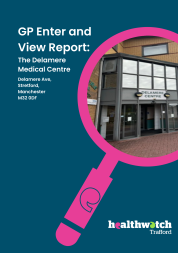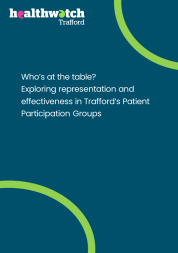HW100: Men's health

We shared this survey via local networks and visited different organisations in the community to survey and talk to men about their experiences. The first six questions of the survey also formed July 2017’s Trafford Healthwatch 100 project, the aim of which is to get a group of people signed up to regularly complete surveys. This project was promoted through the Healthwatch Trafford website, social media platforms and a local radio station. This was an eight-week project partnered with an internship from the University of Manchester. This project took place between 19th June 2017 and 11th August 2017, with a four-week data collection period.
Findings
- 62% of respondents had attended an appointment with a health professional in the last 3 months, with 91% of people having had an appointment in the last year. Only 2% of respondents had attended an appointment more than two years ago. This shows that most people are regularly engaging with health care services and therefore there is an opportunity to promote information about services at these appointments and in the buildings that those appointments take place.
- 82% of people had been to see a GP in the last two years. More than 50% of people had been to see a specialist doctor, a nurse, dentist or pharmacist in the last two years. There was some variation in the number of health professionals people had seen in the last two years. Out of those that had seen a health professional, 36% of people had been to see five or more health professionals and 12% had only seen one. This shows that most people are regularly engaging with health care services.
- 60% of respondents said they would go to their GP to get information about local health services. 55% of people said that they would look on the internet. We do not know from this survey which websites people use but this demonstrates the importance of websites such as NHS choices, being regularly updated and promoted to people. There was some variation in where people would go, but no one said they would use the TV or radio. 18 – 34 year olds were the most likely to go to their friends and family for information, with 37% reporting this. Between the age of 18 -65 most people reported they would use the internet for this information, with 35 – 44 year olds being most likely to use the internet, with 76% of responses saying this.
- In response to whether they would take up free screening, such as for sexual health or cancer, 68% of people said that they would definitely take up this offer. Only 4% of people said that they definitely would not take it up. The most common response, 51%, to why people would take up free screening was that they felt that they had a responsibility to look after their health. The most common reason, 67%, for people saying they might not take up screening was that they did not consider their health to be a priority. As most people said that they would take up free screening, promotion of screening opportunities should be increased in areas where people have contact with health professionals and from the health professionals themselves, particularly in areas where take up rates are currently low.
- 69% of respondents said that if they needed help with their mental health they would go to their GP. 10% said that if they needed help they would not know where to go. This shows that increased promotion of existing services is needed, particularly at points of contact with health professionals given that 91% of respondents regularly access health services.
- There were a range of reasons given in response to what in particular helps them to stay happy and healthy. These varied from 39.6% responding physical activity and 38.9% responding their friends/family to other reasons such as 20.8% giving hobbies as their answer, and 9.4% saying that a good work-life balance helped them. Only 3.4% of respondents said that money helps them to stay happy and healthy. This suggests that social prescribing5 could help more people access social groups and activities that might increase their happiness.
- 45% of people said that nothing prevented them from going to see a health professional. 15% responded that long waiting times for appointments prevented them, which was the most common reason given. Other barriers included respondent’s busy schedules – with 9% reporting this and 8% citing fear as a reason. It would be worth considering what the reality is compared to their expectations of factors such as waiting times and opening hours. This could also suggest that more education is needed about alternative services available, as well as availability of evening and weekend services.
- 72% of respondents said that to improve the health care service provided to them they would make changes to the appointment system. Many people thought that the waiting time for appointments was too long. This figure is much higher than indicated in Healthwatch Blackburn and Darwen’s ‘Blokes View’ project – where 21.3% of men there thought that it was difficult to make an appointment with a GP6 . This suggests that this problem is not only specific to Trafford.
- 64% of respondents were satisfied with healthcare treatment that they have received in the past. 13% of people said that they were definitely not. There were some slight geographical variations in how satisfied people were with health care treatment. This suggests that there is room to improve health care services.
Recommendations
Recommendation: Appointment Systems
- Healthwatch Trafford recommends that particular attention is paid to appointment systems in the re-design of delivery models such as New Models of Care7 . We found that 72% of respondents said they wanted changes to health care appointment systems.
Recommendation: Mental Health
- We recommend that a review of available information and publicity around mental health services is conducted. This is because we found that 13% of respondents didn’t want or know where to access help if they needed it in regard to their mental health.
Recommendation: Communication
- It is important that health care information is communicated effectively, especially regarding appointments. We found that 55% of respondents reported that they faced barriers in going to see a health professional. This suggests there may be scope to improve people’s awareness of what the reality is compared to their expectations in terms of issues like waiting times. More education is needed about alternatives, including NHS 111 and the availability of weekend and evening services. As we know the vast majority of people are attending appointments with health professionals, every opportunity should be taken to educate people of these services, e.g. Leaflets at reception desks or posters on waiting room walls, as well as suggestion from the health professional themselves.
Recommendation: Information
- We think that increased promotion of information could occur at contact with health services. We found that 68% of respondents said they would definitely take up free screening offered, with a further 24% responding that they might. Therefore, we think that screening is an area that could be promoted further, especially as only 40% of those surveyed who were eligible for a 40+ NHS health check had received one.
- Healthwatch Trafford also recommends that more promotion of alternative and reliable information sources, such as NHS 111 and third sector organisations such as Mind is needed.
Recommendation: Further Work
- We recommend that further work is carried out looking at men’s health in Trafford. Particularly, we think that it would be useful to compare the results with a study of the same survey questions but looking at the differences in responses of women in Trafford.
- More comparisons and investigations into how the findings of this report should be carried out to compare to the most recent demographic and health information as soon as the new Joint Strategic Needs Assesment (JSNA) for Trafford becomes available.

